目录
- android中使用Flow封装一个FlowBus工具类
- 1.FlowBus:
- 2.在Activity中的使用:
- 2.1传递参数给主界面Activity:
- 2.2 MainActivity接收:
- 3.在Fragment中的使用:
- 3.1 发送数据
- 3.2 接收javascript数据:
- 4.在Service中的使用:
- 4.1发送数据:
- 4.2接收数据:
- 5.在Websock中的使用:
- 5.1发送数据:
- 5.2接收数据:
- 6.实现的效果如下:
- 7.项目demo源码如下:
Android中使用Flow封装一个FlowBus工具类
做过Android的同学应该都使用过EvenutBus、Rxbus、LiveDataBus、LiveData等,这些第三方不仅要导入依赖包,而且还要注册和取消注册,使用起来非常麻烦,稍不注意就导致内存泄漏,自从接触了Flow、SharedFlow之后感觉使用起来方便多了,于是产生了一个封装通用事件工具类的想法,直接上代码.
1.FlowBus:
/**
* @auth: njb
* @date: 2024/7/18 10:17
* @desc: 基于Flow封装的FlowBus
*/
object FlowBus {
private const val TAG = "FlowBus"
private val busMap = mutableMapOf<String, FlowEventBus<*>>()
private val busStickMap = mutableMapOf<String, FlowStickEventBus<*>>()
@Synchronized
fun <T> with(key: String): FlowEventBus<T> {
var flowEventBus = busMap[key]
if (flowEventBus == null) {
flowEventBus = FlowEventBus<T>(key)
busMap[key] = flowEventBus
}
return flowEvjavascriptentBus as FlowEventBus<T>
}
@Synchronized
fun <T> withStick(key: String): FlowStickEventBus<T> {
var stickEventBus = busStickMap[key]
if (stickEventBus == null) {
stickEventBus = FlowStickEventBus<T>(key)
busStickMap[key] = stickEventBus
}
return stickEventBus as FlowStickEventBus<T>
}
open class FlowEventBus<T>(private val key: String) : DefaultLifecycleObserver {
//私有对象用于发送消息
private val _events: MutableSharedFlow<T> by lazy {
obtainEvent()
}
//暴露的公有对象用于接收消息
private val events = _events.asSharedFlow()
open fun obtainEvent(): MutableSharedFlow<T> =
MutableSharedFlow(0, 1, BufferOverflow.DROP_OLDEST)
//在主线程中接收数据
fun register(lifecycleOwner: LifecycleOwner,action: (t: T) -> Unit){
lifecycleOwner.lifecycleScope.launch {
events.collect {
try {
action(it)
}catch (e:Exception){
e.printStackTrace()
Log.e(TAG, "FlowBus - Error:$e")
}
}
}
}
//在协程中接收数据
fun register(scope: CoroutineScope,action: (t: T) -> Unit){
scope.launch {
events.collect{
try {
action(it)
}catch (e:Exception){
e.printStackTrace()
Log.e(TAG, "FlowBus - Error:$e")
}
}
}
}
//在协程中发送数据
suspend fun post(event: T){
_events.emit(event)
}
//在主线程中发送数据
fun post(scope: CoroutineScope,event: T){
scope.launch {
_events.emit(event)
}
}
override fun onDestroy(owner: LifecycleOwner) {
super.onDestroy(owner)
Log.w(TAG, "FlowBus ==== 自动onDestroy")
val subscriptCount = _events.subscriptionCount.value
if (subscriptCount <= 0)
busMap.remove(key)
}
// 手动调用的销毁方法,用于Service、广播等
fun destroy() {
Log.w(TAG, "FlowBus ==== 手动销毁")
val subscriptionCount = _events.subscriptionCount.value
if (subscriptionCount <= 0) {
busMap.remove(key)
}
}
}
class FlowStickEventBus<T>(key: String) : FlowEventBus<T>(key) {
override fun obtainEvent(): MutableSharedFlow<T> =
MutableSharedFlow(1, 1, BufferOverflow.DROP_OLDEST)
}
}
2.在Activity中的使用:
2.1传递参数给主界面Activity:
/**
* @auth: njb
* @date: 2024/9/10 23:49
* @desc: 描述
*/
class TestActivity :AppCompatActivity(){
private val textView:TextView by lazy { findViewById(R.id.tv_test) }
override fun onCreate(savedInstanceState: Bundle?) {
super.onCreate(savedInstanceState)
setContentView(R.layout.activity_test)
initFlowBus()
}
private fun initFlowBus() {
val messageEvent = MessageEvent()
messageEvent.message = "stop"
messageEvent.state = false
textView.setOnClickListener {
lifecycleScope.launch {
FlowBus.with<MessageEvent>("test").post(this, messageEvent)
finish()
}
}
}
}
2.2 MainActivity接收:
/**
* 初始化
*/
private fun initView() {
binding.rvWallpaper.apply {
layoutManager = GridLayoutManager(this@MainActivity, 2)
adapter = wallPaperAdapter
}
binding.btnGetWallpaper.setOnClickListener {
lifecycleScope.launch {
mainViewModel.mainIntentChannel.send(MainIntent.GetWallpaper)
}
val intent = Intent(this@MainActivity,TestActivity::class.Java)
startActivity(intent)
}
FlowBus.with<MessageEvent>("test").register(this@MainActivity) {
LogUtils.d(TAG,it.toString())
if(it.message == "stop"){
LogUtils.d(TAG,"===接收到的消息为==="+it.message)
}
}
FlowBus.with<MessageEvent>("mineFragment").register(this@MainActivity) {
LogUtils.d(TAG,it.toString())
if(it.message == "onMine"){
LogUtils.d(TAG,"===接收到的消息为1111==="+it.message)
}
}
}
3.在Fragment中的使用:
3.1 发送数据
package com.cloud.flowbusdemo.fragment
import android.os.www.devze.comBundle
import android.util.Log
import android.view.LayoutInflater
import android.view.View
import android.view.ViewGroup
import androidx.fragment.app.Fragment
import androidx.lifecycle.lifecycleScope
import com.cloud.flowbusdemo.databinding.FragmentMineBinding
import com.cloud.flowbusdemo.flow.FlowBus
import com.cloud.flowbusdemo.model.MessageEvent
import kotlinx.coroutines.launch
private const val ARG_PARAM_NAME = "name"
private const val ARG_PARAM_AGE = "age"
/**
* @auth: njb
* @date: 2024/9/17 19:43
* @desc: 描述
*/
class MineFragment :Fragment(){
private lateinit var binding: FragmentMineBinding
private val TAG = "MineFragment"
private var name: String? = null
private var age: Int? = null
override fun onCreate(savedInstanceState: Bundle?) {
super.onCreate(savedInstanceState)
arguments?.let {
name = it.getString(ARG_PARAM_NAME)
age = it.getInt(ARG_PARAM_AGE)
}
Log.i(TAG, "MainFjsragment 传递到 MineFragment 的参数为 name = $name , age = $age")
Log.d(TAG, "姓名:" + name + "年龄:" + age)
}
override fun onCreateView(
inflater: LayoutInflater,
container: ViewGroup?,
savedInstanceState: Bundle?
): View {
binding = FragmentMineBinding.inflate(layoutInflater)
initView()
return binding.root
}
private fun initView() {
val messageEvent = MessageEvent()
messageEvent.message = "onMine"
messageEvent.state = false
binding.let {
it.tvTitle.text = name
it.tvAge.text = age.toString()
it.tvTitle.setOnClickListener {
lifecycleScope.launch {
FlowBus.with<MessageEvent>("mineFragment").post(this, messageEvent)
}
}
}
}
}
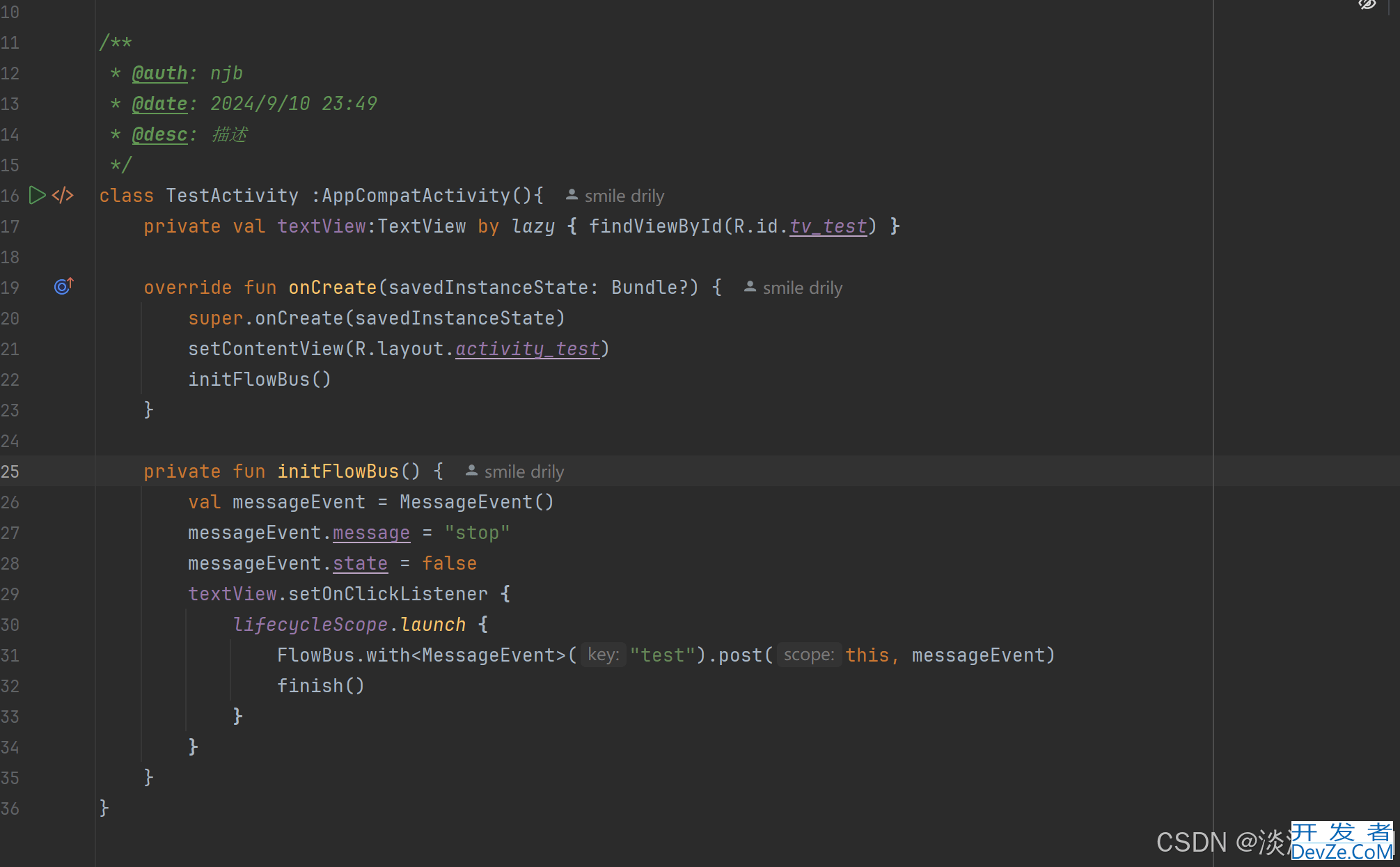
3.2 接收数据:
private fun initView() {
binding.rvWallpaper.apply {
layoutManager = GridLayoutManager(this@MainActivity, 2)
adapter = wallPaperAdapter
}
binding.btnGetWallpaper.setOnClickListener {
lifecycleScope.launch {
mainViewModel.mainIntentChannel.send(MainIntent.GetWallpaper)
}
val intent = Intent(this@MainActivity,TestActivity::class.java)
startActivity(intent)
}
FlowBus.with<MessageEvent>("test").register(this@MainActivity) {
LogUtils.d(TAGhttp://www.devze.com,it.toString())
if(it.message == "stop"){
LogUtils.d(TAG,"===接收到的消息为==="+it.message)
}
}
FlowBus.with<MessageEvent>("mineFragment").register(this@MainActivity) {
LogUtils.d(TAG,it.toString())
if(it.message == "onMine"){
LogUtils.d(TAG,"===接收到的消息为1111==="+it.message)
}
}
}
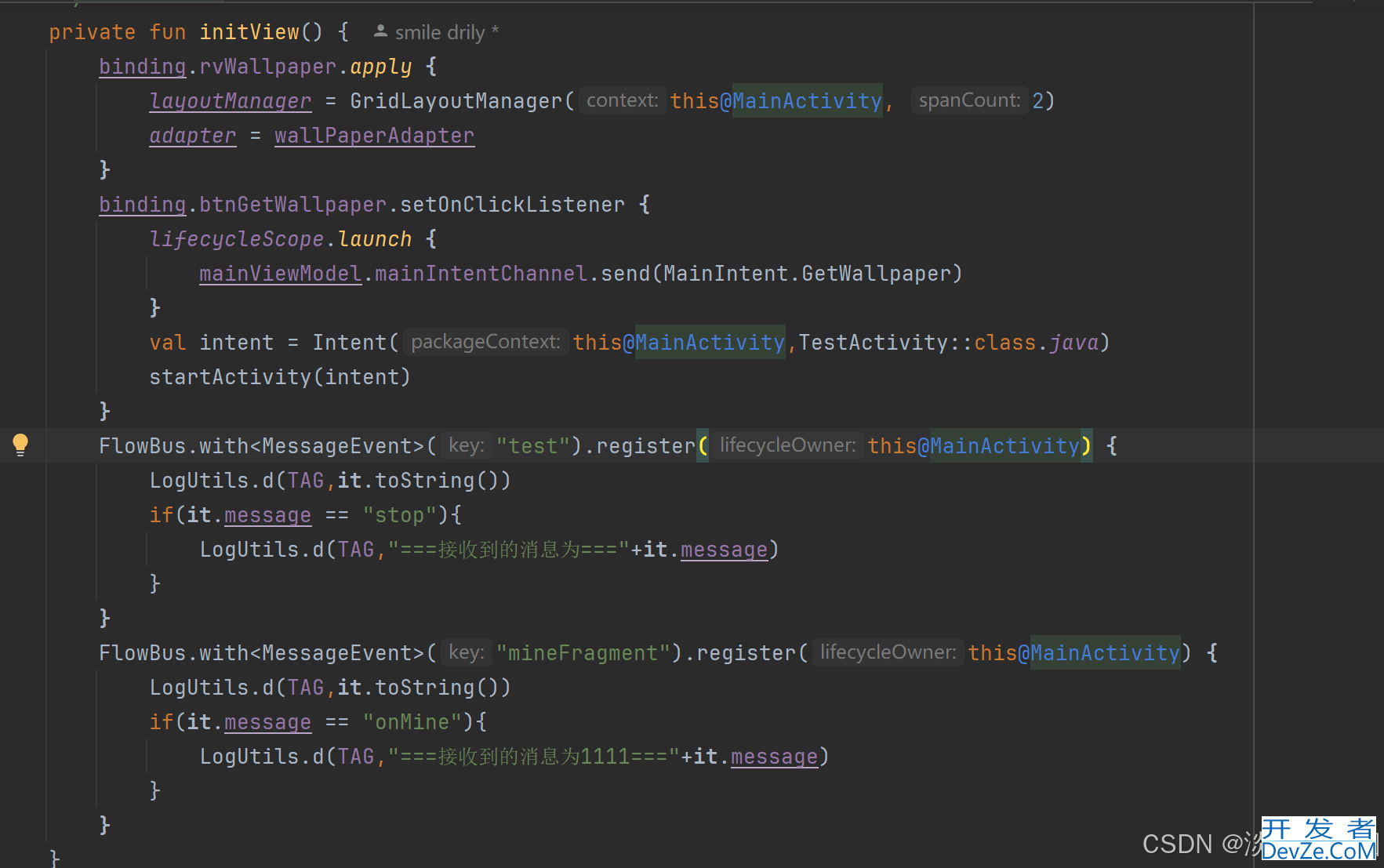
4.在Service中的使用:
4.1发送数据:
private fun initService() {
val intent = Intent(this@MainActivity, FlowBusTestService::class.java)
intent.putExtra("sockUrl","")
startService(intent)
}
4.2接收数据:
/**
* @auth: njb
* @date: 2024/9/22 23:32
* @desc: 描述
*/
class FlowBusTestService:Service() {
private var sock5Url:String ?= null
private val TAG = "FlowBusTestService"
override fun onBind(intent: Intent?): IBinder? {
return null
}
override fun onStartCommand(intent: Intent?, flags: Int, startId: Int): Int {
intent?.let {
this.sock5Url = intent.getStringExtra("sockUrl")
LogUtils.d(TAG,"====收到的ip为==="+this.sock5Url)
}
return if (intent?.action == Constants.ACTION_DISCONNECT) {
disconnect()
START_NOT_STICKY
} else {
connect()
START_STICKY
}
}
private fun connect() {
}
private fun disconnect() {
}
}
5.在Websock中的使用:
5.1发送数据:
private fun connectWebSocket() {
LogUtils.e(TAG, "===connectUrl===$currentWebSocketUrl")
try {
if (mWebSocketManager == null) {
return
}
mWebSocketManager?.addListener(object : SocketListener {
override fun onConnected() {
LogUtils.e(TAG, "===连接成功====")
val messageEvent = MessageEvent()
messageEvent.message = "socket连接成功"
FloatWindowManager.log("socket连接成功")
CoroutineScope(Dispatchers.Main).launch{
FlowBus.with<MessageEvent>("onConnected").post(this,messageEvent)
}
}
override fun onConnectFailed(throwable: Throwable) {
LogUtils.e(TAG, "===连接失败====")
val messageEvent = MessageEvent()
messageEvent.message = "socket连接失败:$currentWebSocketUrl"
FloatWindowManager.log("socket连接失败")
}
override fun onDisconnect() {
LogUtils.e(TAG, "===断开连接====")
val messageEvent = MessageEvent()
messageEvent.message = "socket断开连接"
FloatWindowManager.log("socket断开连接")
}
override fun onSendDataError(errorResponse: ErrorResponse) {
LogUtils.e(TAG + "===发送数据失败====" + errorResponse.description)
val messageEvent = MessageEvent()
messageEvent.message = "发送数据失败--->" + errorResponse.description
FloatWindowManager.log("发送数据失败")
}
override fun <T> onMessage(msg: String, t: T) {
LogUtils.e(TAG,"===接收到消息 String===$msg")
val messageEvent = MessageEvent()
messageEvent.message = msg
FloatWindowManager.log("===接收到消息===$msg")
taskManager?.onHandleMsg(msg)
}
override fun <T> onMessage(bytes: ByteBuffer, t: T) {
LogUtils.e(TAG, "===接收到消息byteBuffer===="+GsonUtils.tojson(bytes))
val rBuffer = ByteBuffer.allocate(1024)
val charset = Charset.forName("UTF-8")
try {
val receiveText =
charset.newDecoder().decode(rBuffer.asReadOnlyBuffer()).toString()
LogUtils.e(TAG, "===接收到消息byteBuffer====$receiveText")
val messageEvent = MessageEvent()
messageEvent.message = receiveText
// FloatWindowManager.log("===收到消息 byte===$receiveText")
} catch (e: CharacterCodingException) {
throw RuntimeException(e)
}
}
override fun onPing(pingData: Framedata) {
LogUtils.e(TAG, "===心跳onPing===$pingData")
}
override fun onPong(framedata: Framedata) {
LogUtils.e(TAG, "===心跳onPong===$framedata")
val messageEvent = MessageEvent()
messageEvent.message = format.format(Date()) + " | 心跳onPong->"
FloatWindowManager.log("===心跳onPong===${format.format(Date())}${"->"}$currentWebSocketUrl")
}
})
mWebSocketManager?.start()
} catch (e: Exception) {
e.printStackTrace()
}
}
5.2接收数据:
private fun initFlowBus() {
FlowBus.with<MessageEvent>("onConnected").register(this@MainActivity) {
LogUtils.d(TAG, "收到消息为:$it")
}
FlowBus.with<MessageEvent>("onStartVpn").register(this@MainActivity) {
LogUtils.d(TAG, "收到vpn消息为:$it")
CoroutineScope(Dispatchers.Main).launch {
if (it.message == "start" && it.state && Constants.SWITCH_IP) {
this@MainActivity.sockUrl = it.sockUrl
LogUtils.d(TAG, "收到代理地址为:${it.sockUrl}")
AppUtils.prepareVpn(this@MainActivity,it.sockUrl)
// prepareVpn()
}
}
}
FlowBus.with<MessageEvent>("onStopVpn").register(this@MainActivity) {
LogUtils.d(TAG, "收到vpn消息为:$it")
if (it.message == "stop" && !it.state) {
AppUtils.stopVpn(this@MainActivity)
}
}
}
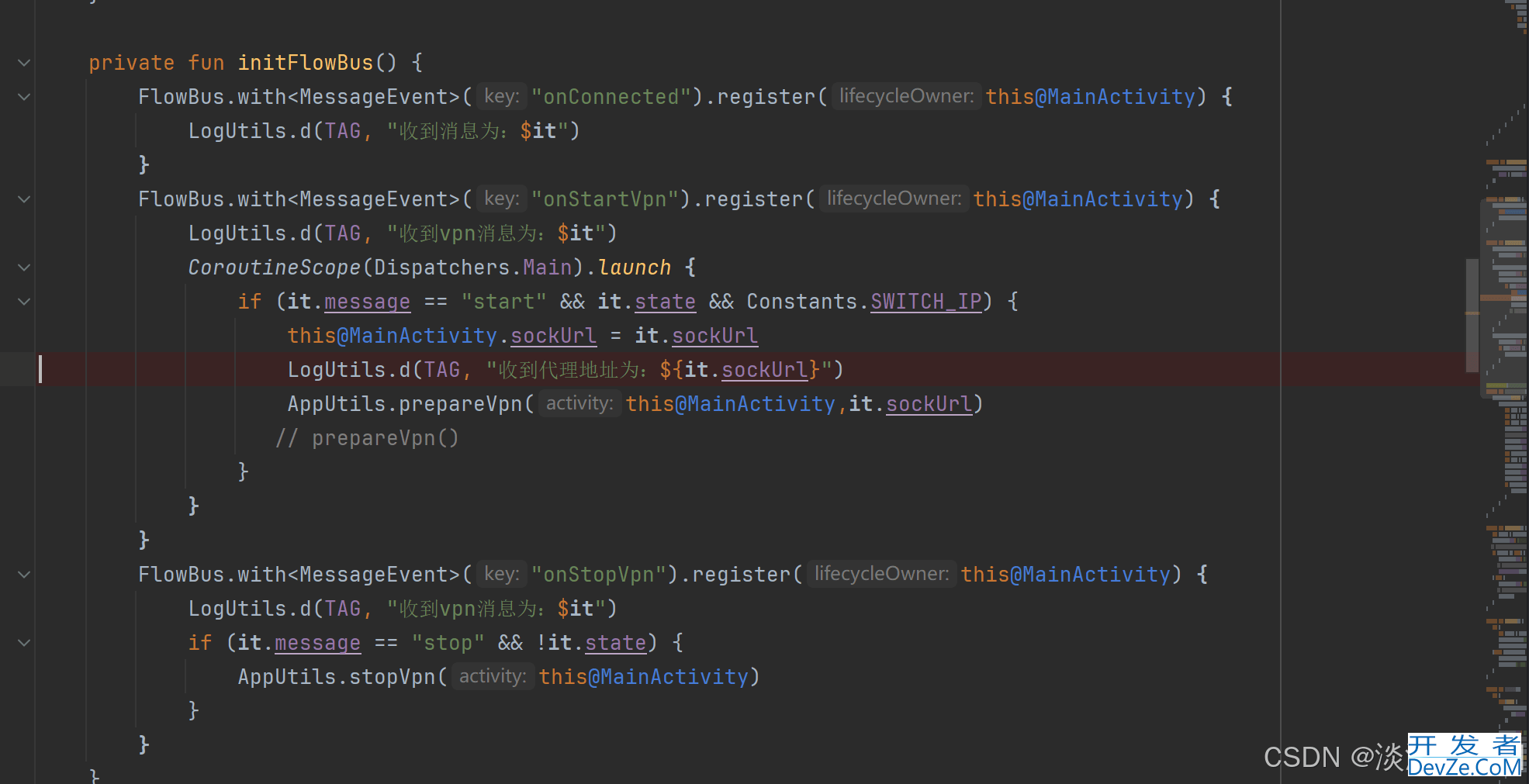
6.实现的效果如下:
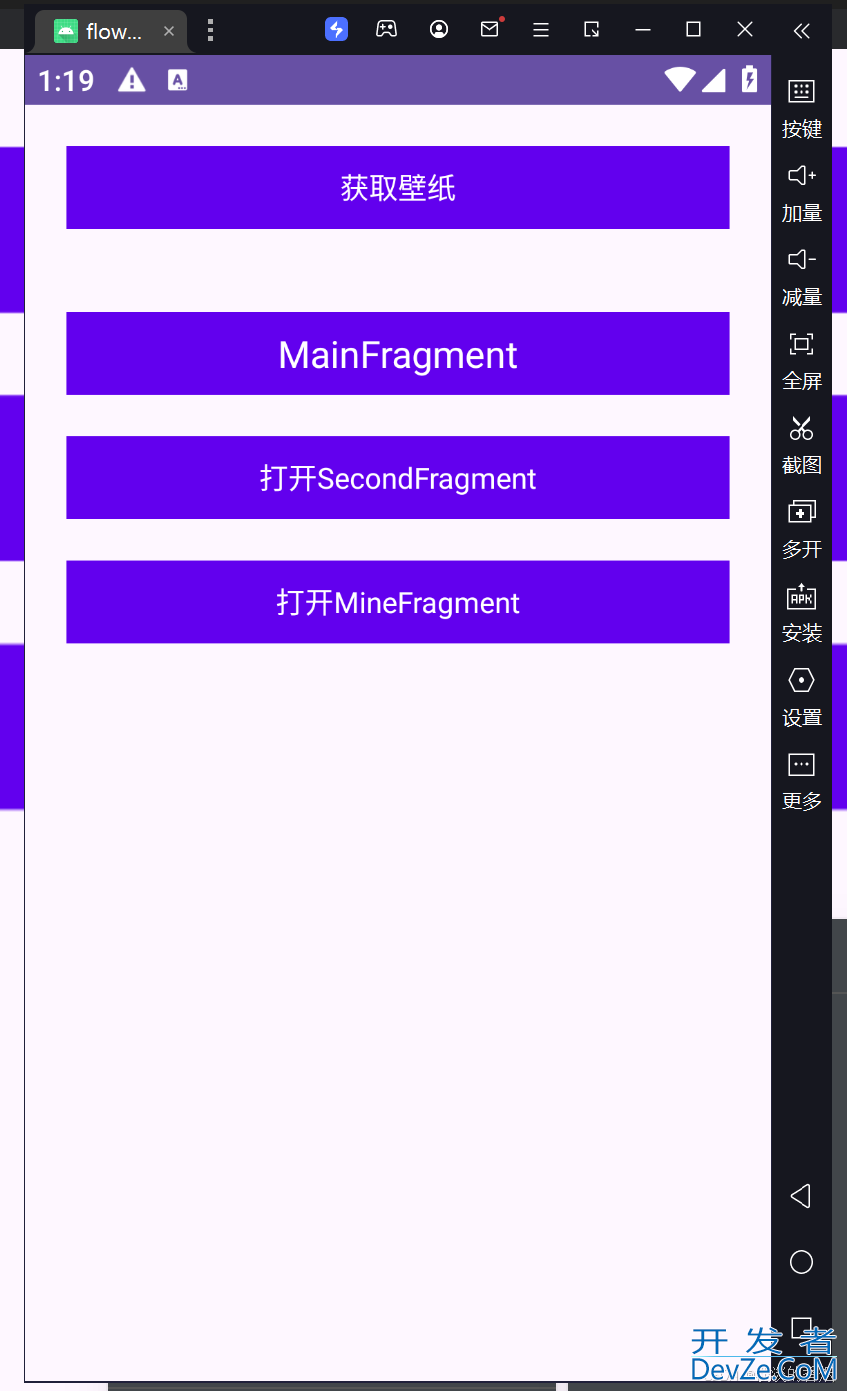
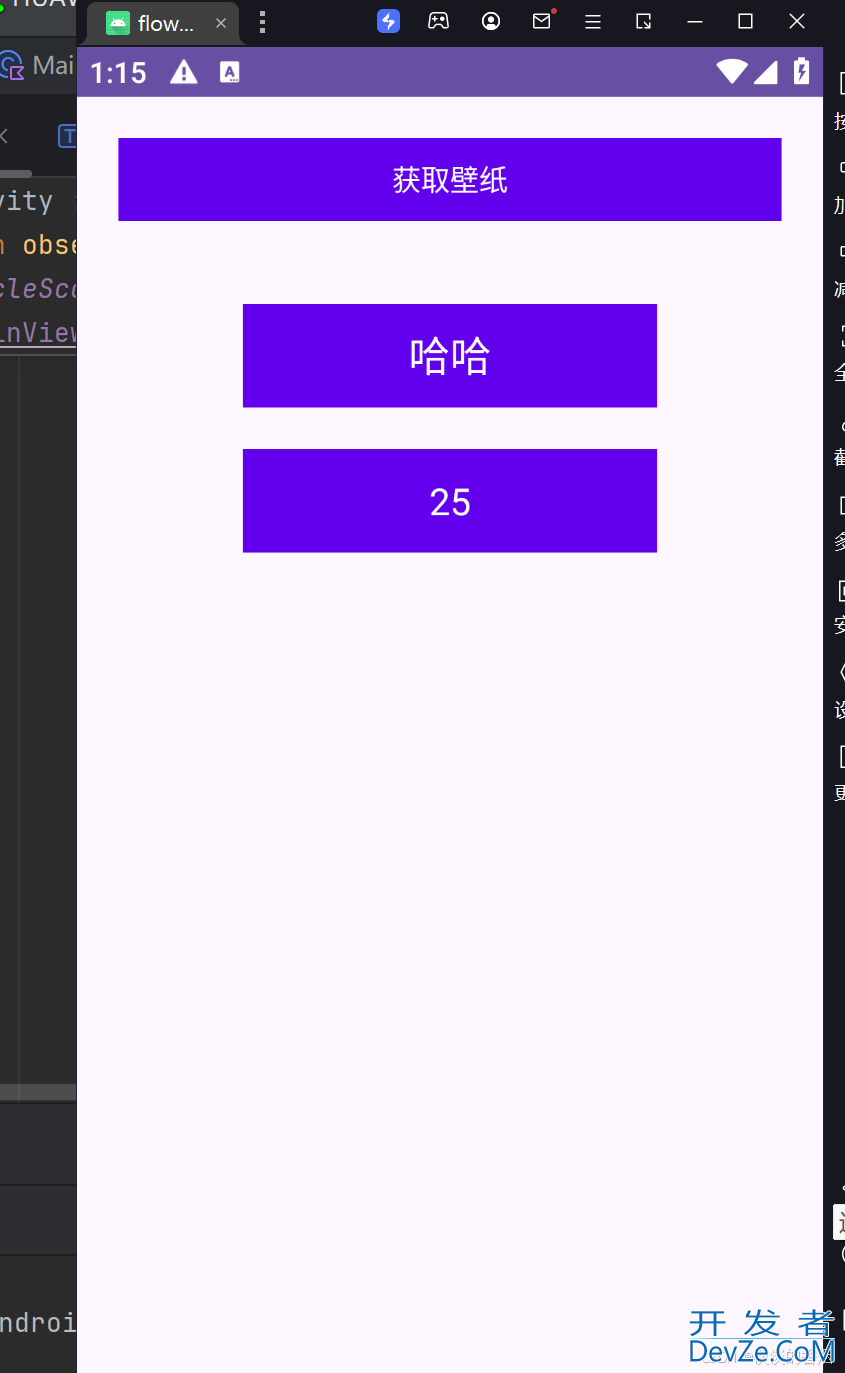
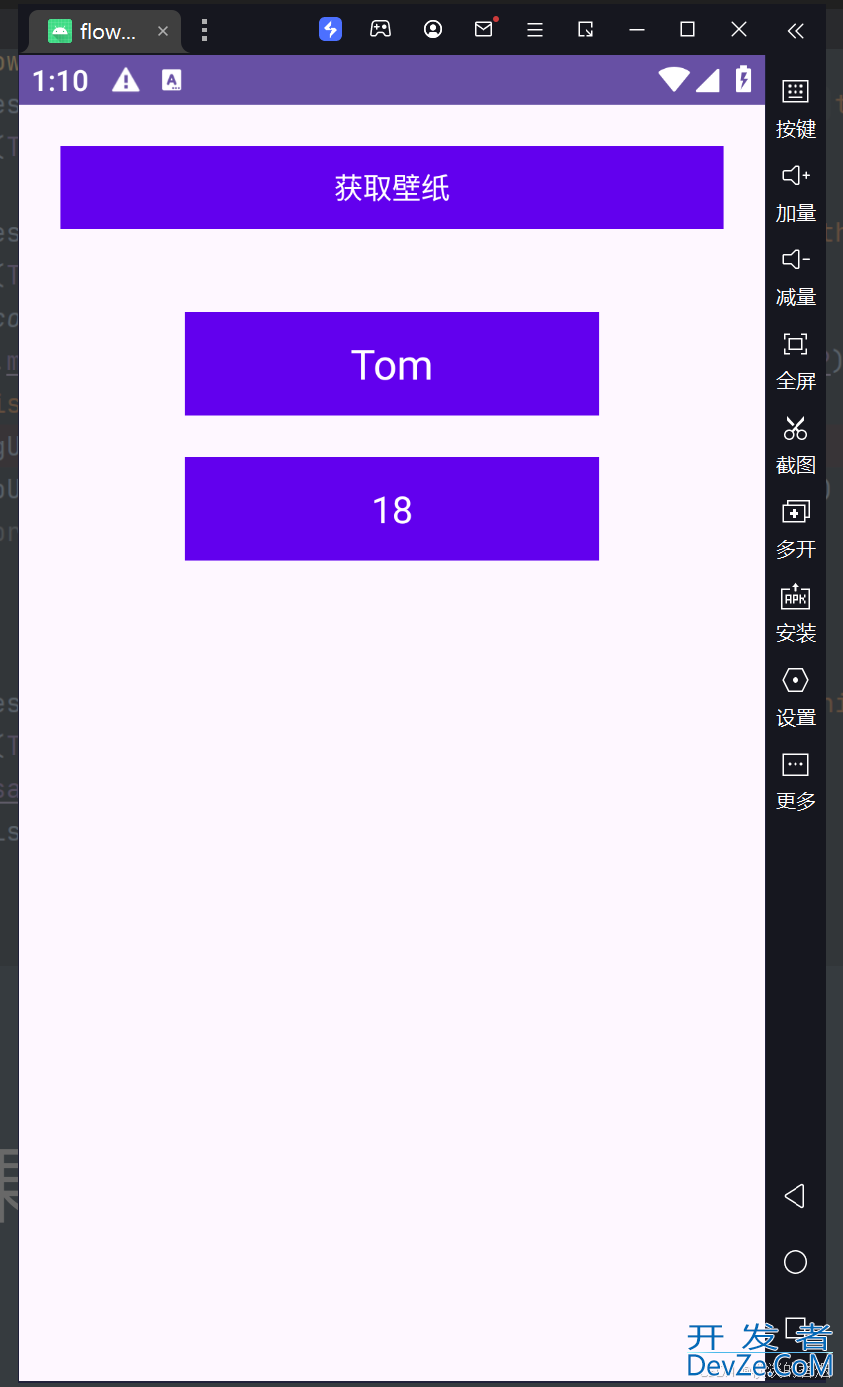
7.项目demo源码如下:
https://gitee.com/jackning_admin/flowbus-demo
到此这篇关于Android使用Flow封装一个FlowBus工具类的文章就介绍到这了,更多相关Android FlowBus工具类内容请搜索编程客栈(www.devze.com)以前的文章或继续浏览下面的相关文章希望大家以后多多支持编程客栈(www.devze.com)!






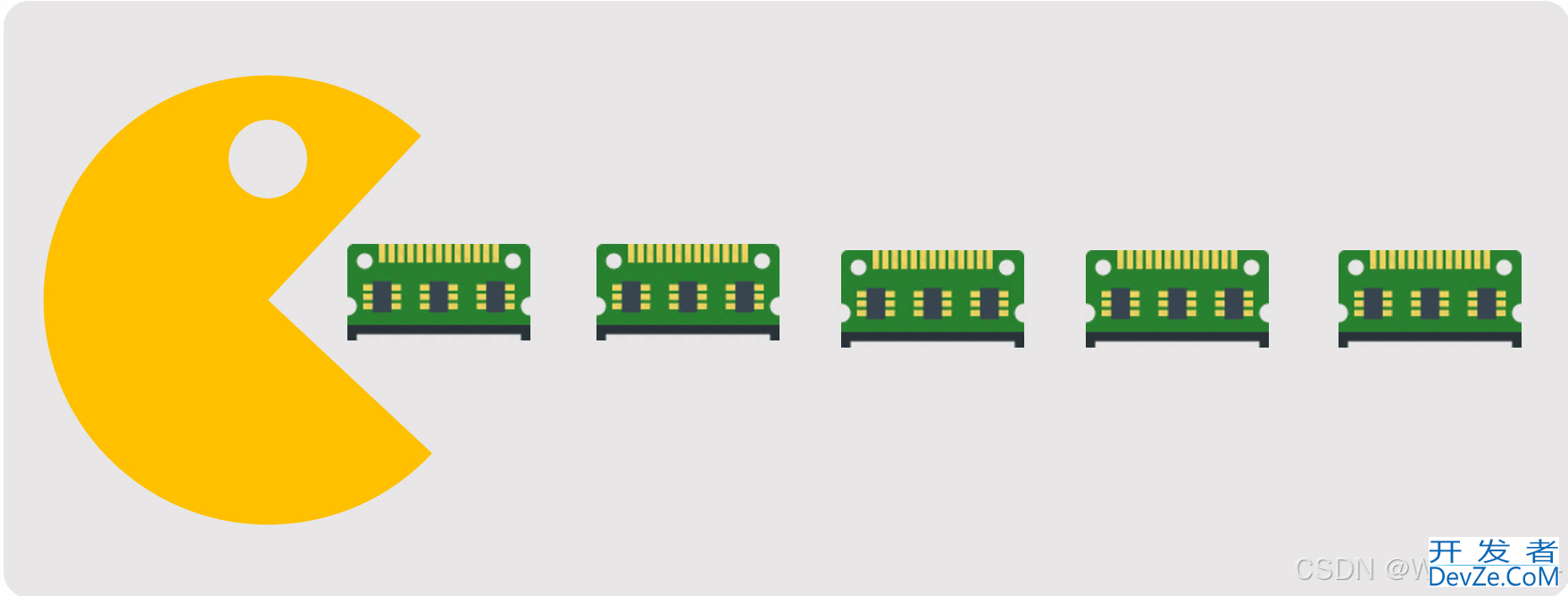

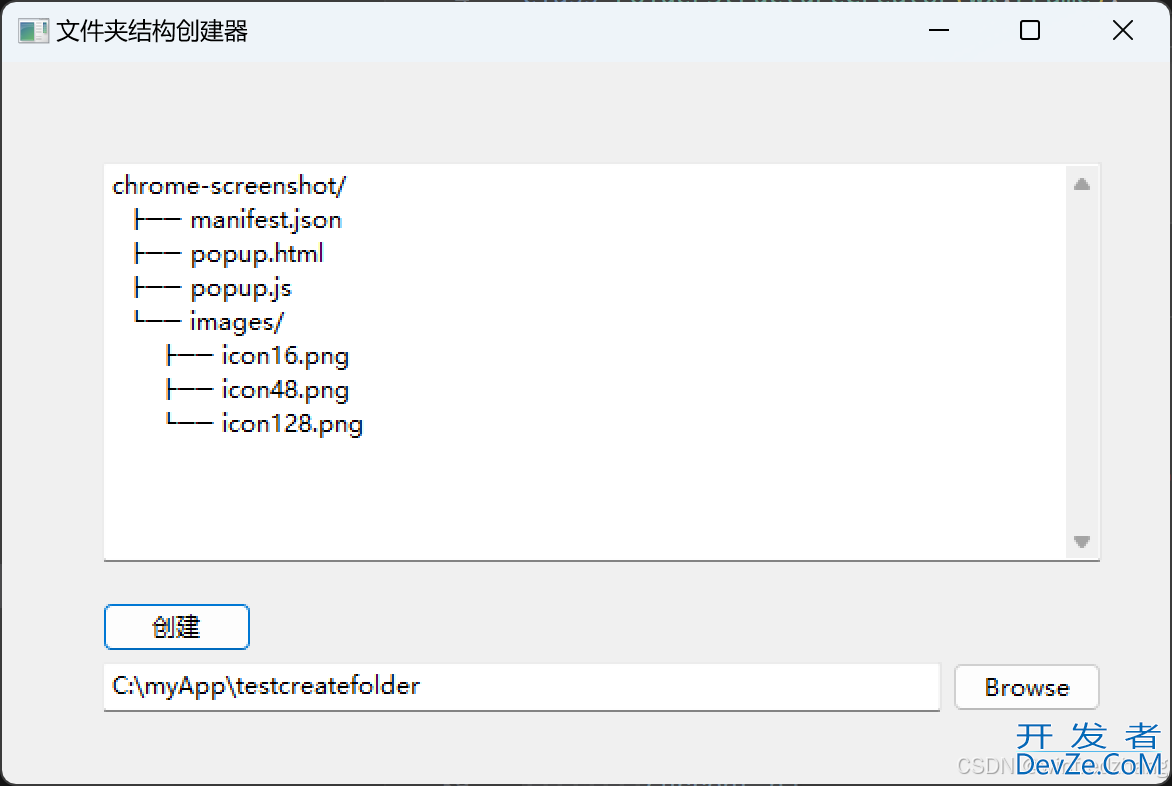
 加载中,请稍侯......
加载中,请稍侯......
精彩评论